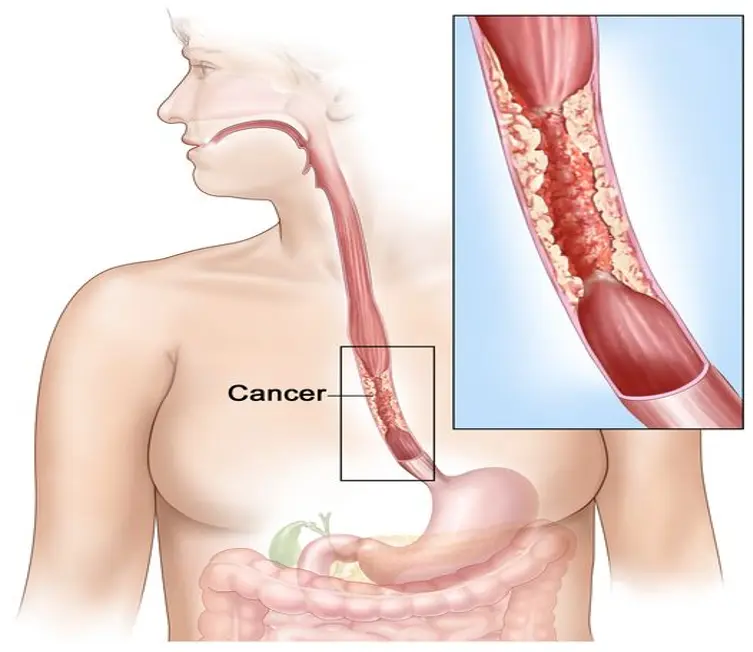

MBBS (AIIMS), MS (Surgery, AIIMS), MNAMS, FACS (USA), FICS (USA), FUICC
Mon, 03 Jul 2023

Esophagus / Oesophagus can be involved by cancer or other tumors. With increasing incidence of acidity problems (Barretts esophagus), the incidence of cancer of esophagus is increasing. Esophageal/oesophageal cancer usually presents with difficulty in swallowing, initially to solids and then liquids also. Gradually, Esophageal/oesophageal cancer increases to total blockage of swallowing. Sometimes, there can be voice change or bouts of coughing on swallowing due to complications.
Minimally Invasive Esophagectomy
The treatment for Esophageal/oesophageal cancer consists of surgery, chemotherapy and radiotherapy, used in combination (multi-modal treatment).
For early tumors, complete surgical removal can even provide cure. Conventionally, removal of esophagus (esophagectomy) has been done through the chest (major opening of chest). We have developed the expertise to perform even better cancer operation by VATS (Key-hole) or Robotic method, which has been offered to our patients for many years with improved outcome. This approach to surgery for removal of esophagus is called Minimally Invasive Esophagectomy (MIE).
Minimally Invasive Esophagectomy surgery involves the removal of the entire esophagus and then creation of new food pipe utilising the stomach and fashioning a tube out of it. The tube is then taken across the chest and joined to the upper esophagus in neck. This operation was done conventionally by open surgery which required large incisions on the chest and abdomen. When done through minimally invasive approach the patients have a shorter stay in the hospital with quicker recovery and much less pain as compared to open procedure.
Dr. Arvind Kumar and his team have taken the minimally invasive esophagectomy to the next level by offering world class esophagectomy using the da Vinci Si Robotic Surgical System. Robot assisted surgery helps the surgeon in being more precise leading to a more accurate surgery with lesser blood loss. This translates in to patients benefits in terms of lesser pain, faster recovery and better cosmetic results with improved quality of life.
Of all operations in which the association between surgical volume and outcomes (surgical results) has been studied, esophagectomy (removal of all or part of the esophagus) is the operation for which the data is clearest that the procedures should be performed at high volume medical centers with the greatest expertise and skills, such as at Institute of Chest Surgery, Chest Onco-Surgery and Lung Transplantation at Medanta Hospital.
Q. What typical signs and symptoms that exist for esophageal cancer?
Swallowing problems, discomfort in the chest, unexpected weight loss, a persistent cough or hoarseness, and blood vomiting are typical symptoms.
Q. What is the method for diagnosing esophageal cancer?
A tiny tube with a camera is usually put into the esophagus during a diagnosis to inspect it closely. Frequently, biopsy samples are collected for further examination.
Q. What are the best available treatments for esophageal cancer?
Surgery, chemotherapy, radiation therapy, targeted therapy, and immunotherapy are all available options for treatment. The patients general health and the stage determination of cancer are the best course of therapy.
Q. When is esophageal cancer surgery advised?
When the cancer is localized and has not spread far, surgery is frequently advised. The esophagus may be partially removed (esophagectomy) or completely removed (esophagogastrectomy).
Q. How long does it take for someone to recover following esophageal cancer surgery?
Recovery can take many different forms, but it often entails a hospital stay, changes in diet, and rehabilitation. Patients can progressively resume their regular activities over time.
Q. Does esophageal cancer surgery have any potential drawbacks or negative effects?
Yes, there are potential side effects including infection, bleeding, surgical connection leaks, and swallowing problems. With the surgical team, such risks should be considered in advance.
Q. It is possible to prevent esophageal cancer?
Although there are no surefire ways to avoid it, making modifications to your lifestyle like giving up smoking, drinking less alcohol, and keeping a healthy weight can reduce the risk. Regular examinations may also aid in the early detection of cancer.
Q. What is the aim of surgery for esophageal cancer?
Surgery for esophageal cancer primarily aims at removing the tumor and any damaged surrounding tissues, including lymph nodes, in order to stop the cancer from growing. Complete resection is desired, although the patients swallowing function and general quality of life must be maintained.
More About Esophageal Cancer
Copyright @ (Prof.) Dr. Arvind Kumar. All Rights Reserved / Thoracic Surgical Oncologis
License Number: U.P State Medical Council (India) No. 27637
